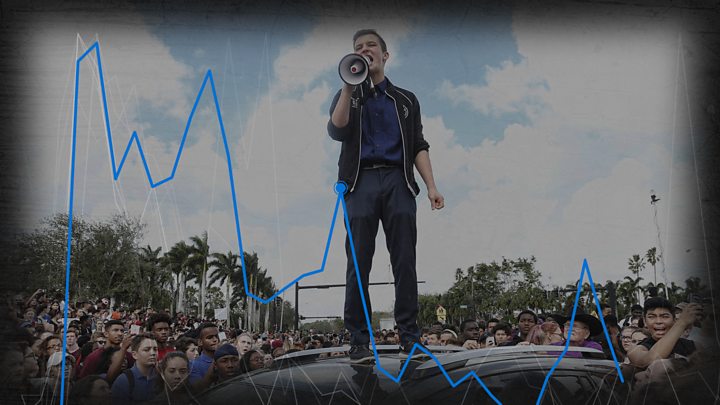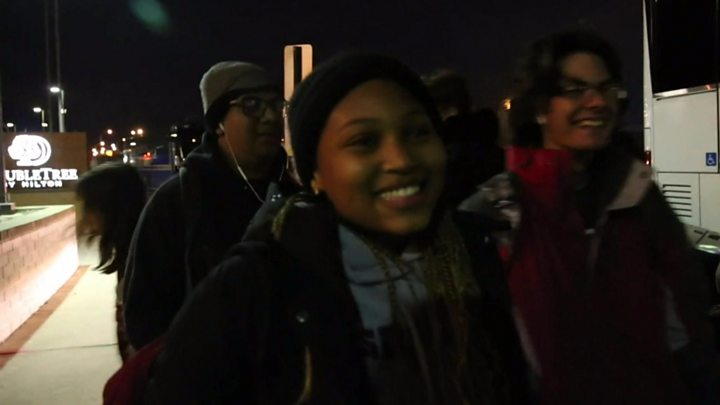March For Our Lives: US set for mass rallies to back gun control

Hundreds of thousands of Americans are gathering for nationwide rallies in support of tighter gun control.
March For Our Lives grew out of a movement calling for change after 17 people were killed by a gunman at a high school in Florida last month.
On Friday, the White House said it would ban bump stocks, which give semi-automatic guns rapid-fire capability.
But many activists are calling for more extensive legislation.
The main march is taking place in Washington DC, with more than 800 sister protests taking place across the country and around the world, including London, Edinburgh, Geneva and Sydney.
Organisers have said it may become "standing room only" in Washington, as the swelling crowds could make it hard to move. The march there begins at 12:00 local time (16:00 GMT).
Participants want to seize on public outrage in the wake of the 14 February massacre at Marjory Stoneman Douglas High School in Parkland to convince US politicians to finally take decisive action, including by banning the sale of assault weapons.
However, the issue divides Americans. The right to bear arms is protected under the 2nd amendment of the US constitution and the National Rifle Association (NRA) gun lobby remains highly influential.
- The teenagers taking on the US gun lobby
- Why I'm marching on Washington
- America's gun culture in 10 charts
Organisers say up to half a million people could rally in Washington DC, which would make it the largest protest since last year's women's march. The singer Ariana Grande and Lin-Manuel Miranda, the man behind hit musical Hamilton, are set to perform.
'My lost soulmate'
Marianna Brady, BBC News, Washington
The crowds started to gather in the early hours of the morning outside the US Capitol. Chants for "no more NRA" and "no more guns" erupt every few minutes at random.
"He was my soulmate," said Victoria Gonzalez, looking down at a sign of her boyfriend Joaquin Oliver.
Valentine's Day - 14 February - started off as a great day for Victoria. "Joaquin and I exchanged gifts in the morning and he walked me to class. I was so happy."
Later that day, she would learn that Joaquin was one of 17 people shot and killed at Marjory Stoneman Douglas school.
"It wasn't real. It's taken a while for it to sink in. I'm here today so no one ever has to face this again," she said, standing in a crowd of several thousand ahead of the march.
"It gives me a lot of hope seeing how many people are out here supporting us. It feels like the whole entire world is on our side," Victoria said.
At a rally in Houston, Texas, Mayor Sylvester Turner called the events a defining moment in US history and announced a commission to tackle gun violence on a local level.
Some 69% of Americans think gun laws should be tightened, according to a new poll by the Associated Press and the NORC Center for Public Affairs Research, up from 61% in October 2016.
What's happened since Parkland?
- After pressure from students, Florida passed a gun control law that raises the legal age for buying rifles in the state but also allows the arming of school staff. The NRA sued the state, saying the law was unconstitutional
- In February, President Trump urged lawmakers to work on bipartisan legislation, accusing them of being "petrified" of the NRA. He supported raising the minimum age for gun purchases but later appeared to back away from that proposal. The White House says he wants to focus on measures that can get through Congress, like improved background checks. He has also backed arming some teachers
- Several major companies cut ties with the NRA amid a #BoycottNRA campaign, while chains like Walmart and Dick's Sporting Goods announced new restrictions on gun sales
- Earlier this month, students and school staff commemorated the Florida school shooting with a mass walkout
